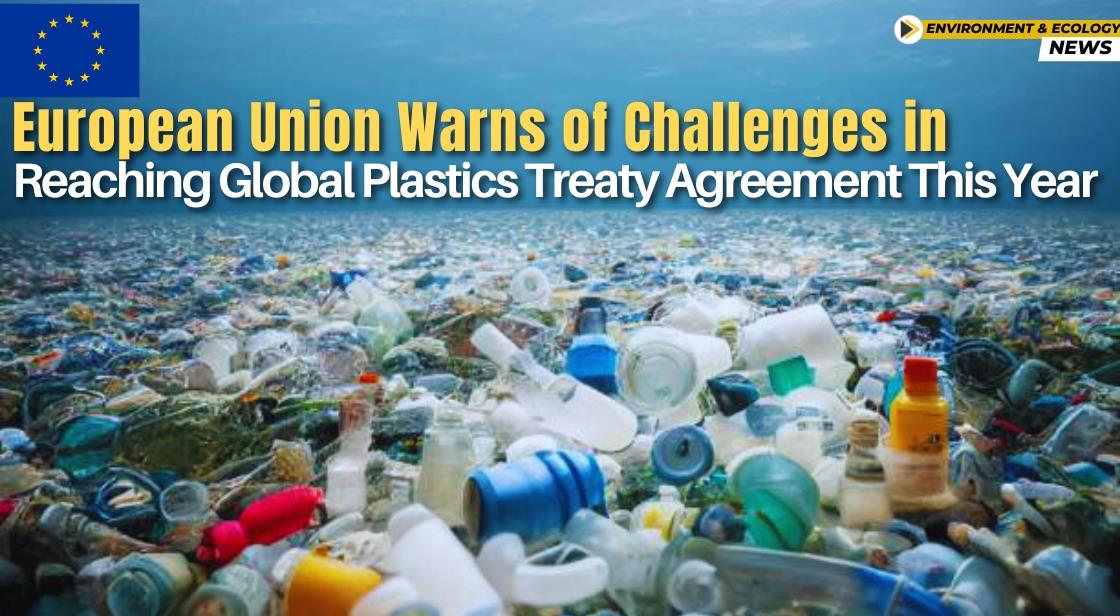European Union Warns of Challenges in Reaching Global Plastics Treaty Agreement This Year

News Synopsis
The European Union has cast doubt on the feasibility of finalizing a global treaty tackling plastic pollution by the end of 2024. This news comes amidst ongoing negotiations plagued by disagreements over production limitations.
Stalled Negotiations: A Deal by Year-End Seems Unlikely
-
Virginijus Sinkevicius, the head of the European Commission's environment department, expressed concerns during a meeting with EU environment ministers. He stated that, based on the current progress, "it will be very difficult to close the negotiations at the INC5 in November."
-
INC5 (Intergovernmental Negotiating Committee 5) signifies the final scheduled round of negotiations before the planned treaty.
The United Nations (UN) had hailed the initiation of negotiations in 2022 as a landmark environmental achievement, comparable to the 2015 Paris Agreement on climate change. Plastic pollution is a pervasive environmental threat, impacting everything from the deepest ocean trenches to mountain peaks, endangering wildlife and human health.
Key Points of Contention: Production Caps Divide Nations
-
A significant point of contention lies in the issue of production limitations. Around 60 countries, including members of the EU, advocate for incorporating production caps within the treaty.
-
However, major petrochemical producers, such as Saudi Arabia and China, have voiced opposition to such measures.
Potential Scenarios: Extending Talks or a Basic Framework?
-
In the event that a deal cannot be reached by November in Busan, South Korea, an extension of the negotiations into 2025 and beyond would be necessary.
-
An unnamed Japanese official involved in the talks suggests the possibility of establishing a basic, high-level treaty framework in Busan. This framework could be strengthened through future amendments and protocols.
This suggestion is partly driven by concerns about a potential return of Donald Trump to the White House in the upcoming US elections. A second Trump presidency might lead to the rollback of environmental policies, potentially dampening global enthusiasm for future treaty negotiations.
Priorities and the Path Forward
-
Environmental groups like Greenpeace advocate for prioritizing a robust framework over a rushed agreement.
-
Graham Forbes, Greenpeace's head of delegation for these talks, emphasizes the need for "a framework that starts to set us on a trajectory towards a much more sustainable relationship to petrochemicals and plastics."
-
He further stresses the importance of an agreement encompassing the "full lifecycle (of plastics)," regardless of potential political shifts in the US.
Conclusion: Navigating a Path Forward on Plastic Pollution
The quest for a global treaty to combat plastic pollution faces a significant hurdle. While the urgency to address this environmental crisis remains paramount, achieving a comprehensive agreement by the year's end appears increasingly challenging.
The European Union's concerns highlight the deep divisions regarding production limitations, a critical element for many nations. Bridging this gap between producer countries and those advocating for stricter regulations will be essential for progress.
Two potential paths emerge:
-
Extending Negotiations: Delaying the deadline allows for more time to reconcile differences and potentially craft a more robust treaty. However, this approach risks losing momentum and delaying crucial action.
-
Basic Framework with Future Amendments: Establishing a foundational framework could offer a starting point for future strengthening. This strategy hinges on a commitment from all parties to build upon the initial agreement.
The ultimate success hinges on prioritizing a holistic approach that addresses the entire plastic lifecycle, as emphasized by Greenpeace. Regardless of the chosen path, a strong and comprehensive treaty remains the ultimate goal.
The international community must find common ground to combat plastic pollution effectively. Collaboration, compromise, and unwavering commitment will be crucial to secure a healthy planet for future generations.









